Northwestern Sends Third Delegation to COP28
For a third year, Northwestern University is sending a delegation of faculty and graduate students to the 28th Conference of Parties (COP28) to the United Nations Framework Convention on Climate Change (UNFCCC). The delegates plan to share and conduct research, gain insight into burgeoning technologies and solutions and connect with other experts investigating issues at the forefront of sustainability. The members of Northwestern’s delegation are also forging new connections with each other, finding intersections between their disparate disciplines and aims to advance climate action. Among the 13 members of the delegation are:
 Lauren M. Baker, PhD Candidate, Department of Political Science
Lauren M. Baker, PhD Candidate, Department of Political Science
Weinberg College of Arts and Sciences
Lauren Baker is a PhD candidate in the Department of Political Science at Northwestern. Her research examines the domestic impact of hosting global environmental governance events such as the UN Framework Convention on Climate Change Conference of Parties (UNFCCC COPs). Using ethnographic methods, her dissertation project focuses on the politics of garbage to illustrate how the spectacle of these mega-events are constructed and the political possibilities they create and foreclose. She is a graduate assistant and instructor with the Northwestern Middle East and North African Studies (MENA) cluster and taught several courses with Chicago Field Studies. She previously worked as Assistant Director at the Project on Middle East Political Science (POMEPS) and Associate Editor at The Monkey Cage, a political science blog hosted by The Washington Post. Lauren earned an MA in Middle East Studies from The University of Texas at Austin and a BA in International Studies from Allegheny College.
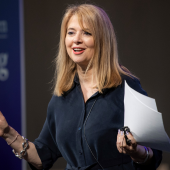
Francesca Cornelli, Dean and Professor of Finance
Kellogg School of Management
Francesca Cornelli is Dean and Professor of Finance at the Northwestern Kellogg School of Management, where she holds the Donald P. Jacobs Chair in Finance. Since joining Kellogg in 2019, she has continued the school's legacy of shaping empathetic, creative leaders while also establishing and expanding programs related to sustainability, private equity, DEI and the intersection of business, science and technology. Previously, she was Professor of Finance and Deputy Dean at London Business School. Cornelli's research interests include corporate governance, private equity, privatization, bankruptcy, IPOs and innovation policy. She has taught at top schools such as the University of Pennsylvania's Wharton School, Duke University's Fuqua School of Business, the London School of Economics and Political Science, the Indian School of Business in Hyderabad and the New Economic School in Moscow.
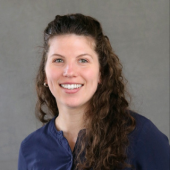
Stella Fors, PhD Candidate, Department of Chemistry
Weinberg College of Arts and Sciences
Stella Fors is a PhD candidate in the Department of Chemistry at Northwestern who researches sustainable electrochemical processes for transforming CO2 into industrial chemicals. Before graduate school, Stella worked as a research chemist at HRL Laboratories, where she contributed to several projects in polymer coatings, inks and adhesives, becoming an inventor on four patents. She holds a BS with honors in Chemistry from UCLA, where she developed DNA/gold-mediated reactions to modify peptides as a Dorothy and Raymond Wilson Research Fellow. She is a technical writer for the Science Policy Outreach Taskforce, where she promotes nonpartisan and scientifically-sound policymaking in the Illinois legislature by researching for and writing informational briefings for state legislators. While at COP28, Stella will study how science is translated across the international policy pipeline during the assessment of the Paris Agreement.

Angela Lee, Mechthild Esser Nemmers Professor of Marketing, Faculty Director of the Golub Capital Social Impact Lab
Kellogg School of Management
Angela Y. Lee joined the Department of Marketing faculty at the Northwestern Kellogg School of Management in 1995 and was named Mechthild Esser Nemmers Professor of Marketing in 2007. She is a consumer psychologist, and her expertise is in consumer learning, goals and emotions. Her research focuses on consumer motivation and affect, cross-cultural consumer psychology and nonconscious influences of memory on judgment and choice. Her publications appear in both marketing and psychology journals, and she is the co-editor of Kellogg on China (Northwestern University Press, 2004). She was the recipient of the 2006 Stanley Reiter Best Paper Award for her research on self-regulation and persuasion, and the 2002 Otto Klineberg Award for the best paper on international and intercultural relations. She is a Fellow of the American Psychological Society and a Fellow of the Society of Experimental Social Psychology.
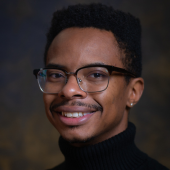
Brian E. Lovejoy, Jr., PhD Candidate, Program in Plant Biology and Conservation
Weinberg College of Arts and Sciences
Brian Lovejoy is a third-year PhD candidate in the Plant Biology and Conservation Program at Northwestern. This year, he received an Illinois-Indiana Sea Grant award for his project entitled "Evaluating the Social and Ecological Aspects of Lawn Replacement." His interest is urban ecology, specifically involving understanding how urban development might change moving forward to be more ecologically friendly than it has been historically. At COP28, he is interested in learning how other nations are addressing urban environmental issues to inform his research.
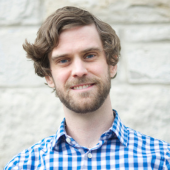
Mike M. McMahon, Strategic Partnerships Administrator
Paula M. Trienens Institute for Sustainability and Energy at Northwestern
Mike M. McMahon is Strategic Partnerships Administrator at the Paula M. Trienens Institute for Sustainability and Energy at Northwestern, a university-wide hub for interdisciplinary research and education. He is responsible for leading collaborative efforts across Northwestern schools, departments and programs as well as helping to manage partnerships with vital industry, NGO, research and civic organizations on behalf of the university. This includes major collaborations with the International Union for Conservation of Nature (IUCN), The Nature Conservancy (TNC) and World Wildlife Fund (WWF) among many others. He received a master’s in public policy from Harvard Kennedy School of Government and worked in state, federal and regional energy and environmental policy in the Midwest prior to joining the Northwestern Trienens Institute in 2016.
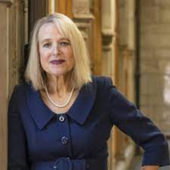
Lori Ann Post, Buehler Professor for Aging, Director of the Buehler Center for Health Policy and Economics
Feinberg School of Medicine
Lori Ann Post, PhD, is the Buehler Professor for Aging in the Departments of Emergency Medicine and Medical Social Sciences at the Northwestern Feinberg School of Medicine. She also serves as the inaugural Director of the Buehler Center for Health Policy and Economics. Post is an injury control scientist whose work is focused on policy and injury prevention. As a demographer and epidemiologist, she is an expert in surveillance systems and policy-to-action research. Her theoretical work on mobilizing public will and political will for social change has been funded by USAID, the World Bank, USDA International and the Department of Defense. Recently, she researched the role of mobilizing public will to secure political will to combat food security in low-income countries with a particular focus on Senegal and Uganda. During the pandemic, she pivoted to tracking and forecasting COVID-19 outbreaks in 217 countries and territories. Post currently co-leads Northwestern Buffett's Global Opioid Crisis group.
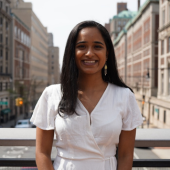
Sapna Ramesh, PhD Candidate, Department of Chemical and Biological Engineering
McCormick School of Engineering
Sapna Ramesh is a third-year PhD candidate in the Department of Chemical and Biological Engineering and part of the Lopez Research Group at Northwestern. Her research focuses on investigating electrolyte reduction mechanisms in lithium metal batteries to engineer more sustainable, safe and efficient energy storage systems. Outside of the lab, Sapna is involved in her department's Anti-racism, Diversity, Equity and Inclusion (ARDEI) committee as well as the Climate Technology Club. At COP28, Sapna hopes to follow negotiations surrounding electrification and critical mineral resources that are used in batteries.

Aman Shaikh, Graduate Student, Master of Engineering Management Program
McCormick School of Engineering
Aman Shaikh is a graduate student in the Master of Engineering Management Program at Northwestern. His professional journey has been fueled by a passion for solving intricate challenges and delivering exceptional value to clients through cutting-edge technology. With a robust background in the software development lifecycle, project and product management, the industrial internet of things and business process modeling, he holds multiple certifications and has a patent to his credit. Over the course of his career, he has held roles at esteemed global corporations like Schneider Electric where he worked as a Deputy Manager in Research and Development as well as dynamic startups like Neewee Analytics and Signzy Technologies in the role of Business Analyst.
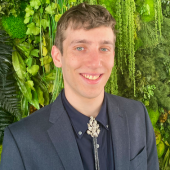
Benjamin Shindel, PhD Candidate, Department of Materials Science and Engineering
McCormick School of Engineering
Benjamin Shindel is a PhD candidate in the Department of Materials Science and Engineering and part of the Vinayak P. Dravid (VPD) Group at Northwestern. His research focuses on developing adsorbent materials for applications in water remediation, resource recovery and carbon capture. He has recently published work on designing nanomaterial coatings for heavy metal remediation, as well as on exploring the "moisture-swing" methodology for direct air carbon capture—materials that can capture carbon dioxide under dry conditions and release it under humid conditions. He is also a graduate fellow with the Brady Scholars Program in Ethics and Civil Life at Northwestern, where he mentors a cohort of undergraduate students as they develop a long-term service project in the city of Evanston.
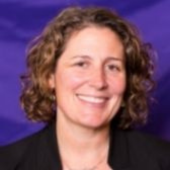
Kimberly R. Marion Suiseeya, Associate Professor of Political Science
Weinberg College of Arts and Sciences;
Faculty Fellow, Roberta Buffett Institute for Global Affairs
Kimberly R. Marion Suiseeya is an Associate Professor in the Department of Political Science and the Environmental Policy and Culture Program at Northwestern. She is also a faculty affiliate of the Northwestern Center for Native American and Indigenous Research as well as a Faculty Fellow at the Northwestern Buffett Institute for Global Affairs. She is an environmental social scientist with expertise in environmental justice, global environmental politics, Indigenous politics and community-driven research. Her research examines how Indigenous communities shape and are impacted by multilateral environmental agreements like the United Nations Framework Convention on Climate Change. She is the Co-Head of Northwestern University’s Delegation to COP28.

Max Wang, MD and PhD Candidate
Feinberg School of Medicine and McCormick School of Engineering
Max Wang is a MD/PhD student in the Northwestern Feinberg School of Medicine and Northwestern McCormick School of Engineering, where he recently defended his PhD on rational drug design using nanotechnology approaches. He has won numerous awards for his research, including a Conquer Cancer Merit Award from the American Society of Clinical Oncology, a Scholar-in-Training Award from the American Association for Cancer Research, a Young Investigator Award from Baxter International Inc. and a Ruth L. Kirschstein National Research Service Award from the National Institutes of Health. Prior to Northwestern, he received his bachelor’s degree from UC Berkeley and his master's from Yale University, where he studied infectious diseases and conducted field work in multidrug-resistant tuberculosis clinics in South Africa.
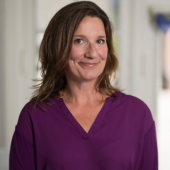
Sera Young, Associate Professor of Anthropology
Weinberg College of Arts and Sciences
Sera Young is an Associate Professor of Anthropology and Global Health at Northwestern. She has dedicated her career to understanding how women, especially in low-resource settings, cope to preserve their health and that of their families. Her current research is focused on quantifying human experiences with problems with water and unpacking their consequences for nutrition, health and well-being. She led a large multi-disciplinary team to develop the first cross-culturally equivalent way of measuring water access and use at the household and individual levels. These scales, called WISE Scales, have been used by 100+ organizations in more than 50 countries to understand how water insecurity shapes outcomes across many sectors, make decisions about resource allocation and evaluate the impact of investments in water. She has co-authored more than 150 peer-reviewed publications, and her awards include the Margaret Mead Award for her book Craving Earth, an Andrew Carnegie Fellowship and a Leverhulme Visiting Professorship. She co-leads the Making Water Insecurity Visible Global Working Group at the Northwestern Buffett Institute for Global Affairs.
After COP28, the delegates will synthesize their research for their dissertations and journal notes as well as share insights into new innovations in sustainability through collaborating with registered student organizations and more.
